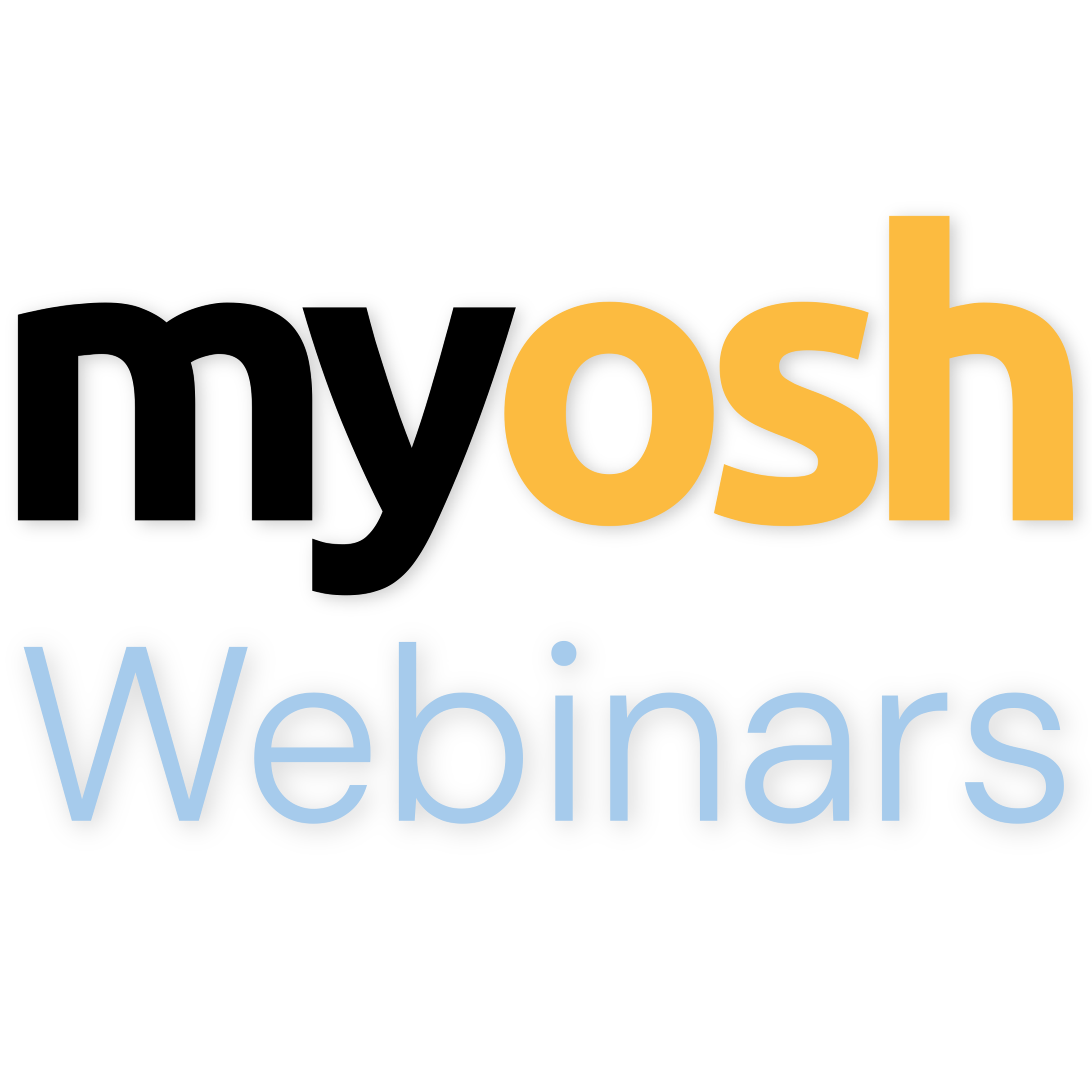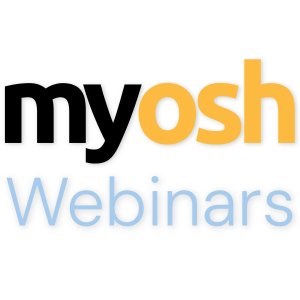
9.6K
Downloads
243
Episodes
myosh hosts regular HSEQ Industry Webinars. These podcasts include all of our webinars presented by leading industry experts and include topics such as Safety Differently, Mental Health, HSEQ Law, Leadership, Learning Teams, HOP (Human Organisational Performance), Chain of Responsibility, Safety Culture, Climate and much more.
Episodes

Tuesday Sep 14, 2021
Contractor Management – Your Obligations, Your Risks, & the Challenges
Tuesday Sep 14, 2021
Tuesday Sep 14, 2021
Engaging contractors is essential to the operation of many businesses and can underpin the success of an organisation’s activities, business model, brand, and culture. However, these services come with inherit risks.
It is imperative that persons conducting a business or undertaking (PCBUs) and shared duty holders implement robust governance frameworks, management systems, pre-qualification processes, and compliance strategies that facilitate the successful procurement and engagement of contractors. This then enables an organisation to deliver services and business activities in a manner that aspires and aims to ensure work is undertaken without risk to health and safety.
This Contactor Management webinar will provide you with practical advice on how to demonstrate due diligence, limit your liability, and how to recognise when it may be desirable to take greater control over a contractor’s safety arrangements.
This moderated presentation and discussion includes case studies that showcase practicable and sustainable approaches to contractor management and how this has assisted business and shared duty holders to operate safely, efficiently and with agility in today’s regulatory and economic environment.
The case studies also cover recent learnings from sudden changes to business operations and requirements during the current COVID-19 pandemic.

Tuesday Sep 14, 2021
Using Sport Science and Wearable Technology to Reduce Injury Risks
Tuesday Sep 14, 2021
Tuesday Sep 14, 2021
Presented by Scott Coleman (Managing Director, Preventure)
Research has indicated that traditional approaches to safety training (including manual handling training) are ineffective at changing worker behaviour and reducing injury risks. However, the Sports Science model of using wearable technology and data analysis to identify injury risks, then providing individualised training and feedback has been proven to effectively change behaviour and reduce injury risks.
In this session, we’ll review the research and methods behind successful sports-based injury prevention programs, and demonstrate how the same methods can be used to protect workers from injury in a cost-effective and sustainable way. We’ll also explore the use of data analysis and smartphone technology to:
-
- identify specific injury risks for individual workers
- identify which training modules the worker needs to complete to reduce these risks, and
- deliver these training modules to the worker through their smartphone

Tuesday Sep 14, 2021
Safety Differently in Practice
Tuesday Sep 14, 2021
Tuesday Sep 14, 2021
Presented by Kelvin Genn, MD Art of Work
Safety has traditionally been about the elimination of negative outcomes (incidents, injuries, errors, malfunctions). While this approach has lead to significant improvements it has also produced several problematic side effects: disengagement and disempowerment of people, increasing bureaucracy, loss of innovation and productivity. Furthermore, many organisations now struggle with plateauing safety records. Some industries even experience increasing injury and fatality rates despite unprecedented investments in safety.
Over the last 5 years, a growing number of organisations and thought-leaders have developed a set of ideas and practices that help organisations to overcome the current impasse. In this Webinar, attendees will be introduced to the assumptions, principles and practices that underpin Safety Differently in Practice, drawing upon the experiences and examples for organisations that are on the journey. The webinar provides attendees with insight as to how safety differently can be enabled at the operational, functional and strategic levels of organisations. Suitable participants are managers, supervisors, technical experts, safety professionals and safety representatives.

Monday Sep 13, 2021
Emergency Management Planning and Returning to the Workplace
Monday Sep 13, 2021
Monday Sep 13, 2021
Presented by Michael Hutcheson, Mark Bluett, and Adam Hart
For many businesses, emergency management planning has taken a back seat due to the sudden and widespread impacts of the current pandemic.
Prior to its onset, managing Emergency Management in many facilities was a relatively straightforward task for those responsible; compliance matters were scheduled, warden numbers stable and evacuation diagrams have expiry dates to ensure their review was on time. The COVID-19 Pandemic disrupted facility managers’ plans for maintaining compliance by creating the pressing needs to relocate staff, adapt business practices and technology, and manage a building with very few occupants.
As Australia’s States and Territories progress through the stages of restrictions, how should Emergency Management be managed, and how do you plan the return of people to their workplace?
This Returning to the Workplace webinar provides practical advice on how to maintain Emergency Management Compliance, taking into account reduced occupancy levels while observing social distancing and hygiene requirements.
This moderated presentation and discussion includes practical approaches, while staff remain out of the office and as they begin to return to your workplace, that will provide your building and business the flexibility needed to maintain emergency management compliance as the current situation and restrictions are eased.

Monday Sep 13, 2021
Putting Safety II in Practice
Monday Sep 13, 2021
Monday Sep 13, 2021
Presented by David Provan and Kym Bancroft
Safety II principles and ideas are increasingly being explored by organisations as they seek to further improve their safety performance and re-shape their safety practices and culture. There is however some misunderstanding about what Safety II is and how it is different from our traditional ‘Safety I’ approach.
Dr David Provan explains the key aspects of Safety II and what they mean for the way we think about managing our organisations. There are now many organisations internationally with implementation experience of Safety II. Urban Utilities is one of the leading organisations who has been implementing Safety II for several years. Kym Bancroft shares their story and what they have practically done directly in relation to the key aspects presented by David.

Monday Sep 13, 2021
A Learning Teams Approach to Risk Assessments
Monday Sep 13, 2021
Monday Sep 13, 2021
Presented by Mark Alston
Traditional risk assessments are used by organisations to justify decisions already made and to ratify controls that are already in place. Risk assessments can become a ‘cut & paste’ exercise with little or no innovation discovered. Controls remain predominately focused on ‘Safety Work’ rather than the ‘Safety of Work’.
Utilising a Learning Teams approach to risk assessments, allows a facilitator to explore the work as normal, focus on assessing genuine risks and enable an environment that encourages a risk assessment team to innovate. This approach can be easily incorporated into organisations existing risk assessment processes.

Monday Sep 13, 2021
SMART Work Design: The Secret to Thriving Employees
Monday Sep 13, 2021
Monday Sep 13, 2021
What’s covered?
Presented by Lena Wicha
Research consistently finds that factors associated with work and the work environment can significantly increase the likelihood of employees developing physical and mental health conditions. Unlike physical hazards (e.g. exposure to noise or asbestos), which are only present for specific roles and industries, mental health risks exist in every industry and job.
Empirical studies in the organisational context show that the increased risk to develop mental ill-health is primarily a result of poorly designed work. So how can we design work that keeps employees well?
The SMART work design model, developed by Australian Research Council Laureate Fellow Professor Sharon Parker at the Centre for Transformative Work Design (CTWD), is a framework that can be used to design healthy, meaningful and motivating work that not only keeps employees well but helps them thrive.
Based on decades of research, the SMART work design model identifies five key themes that result in thriving organisations. Focusing on SMART work design enables organisations to design engaging and enriched jobs, helping to create significant benefits for individuals, teams and organisations across jobs and industries.

Monday Sep 13, 2021
Safety Leadership with Lloyd D’Castro
Monday Sep 13, 2021
Monday Sep 13, 2021
Presented by psychologist Lloyd D’Castro (MD, Working Life – People Solutions)
We all know a significant factor to achieving great safety outcomes in any organisation is dependent upon having employees confident enough to speak up about their concerns, and furthermore, when they do speak up, for leaders to listen, then act. But what does it take to create an environment that employees speak up?
For some answers to this, we look at what we have learnt and continue to learn from fMRI’s (Functional Magnetic Resonance Imaging) research and combine it with practical everyday brain-friendly language – language that gives the brain more comfort. This session will unashamedly put the onus on leaders at all organisational levels to lead with the brain in mind.

Monday Sep 13, 2021
Reward and Recognition in Safety
Monday Sep 13, 2021
Monday Sep 13, 2021
Presented by Anthony Gibbs (CEO, Sentis)
How conscious are your leaders of the safety behaviours they actually reward? According to a recent study of 8,212 participants across heavy industry, 89% of workers report that their leader struggles to display effective recognition for strong safety performance. In fact, only 1 in 10 workers hold positive perceptions of their leader’s recognising ability.
Ineffective recognition can have unintentional consequences and drive unhelpful safety behaviours that put workers at increased risk. In this webinar, we explore the concept of effective recognition and how to leverage intrinsic motivation to create long-term, positive safety culture change.
Learning outcomes:
-
- Explore the importance of recognition in influencing the behaviour of employees.
- Learn the basics of how to recognise others effectively.
- Understand the inherent challenges in most reward and recognition systems and how to overcome these.
- Learn how to build intrinsic motivation within your team for improved safety performance.

Monday Sep 13, 2021
Webinar: Managing Building Compliance through COVID-19 and Beyond
Monday Sep 13, 2021
Monday Sep 13, 2021
What’s covered?
Presented by Brad Paroz, David Hauser, and Dr Chong Chee Goh
Given the dynamic and varied nature of COVID-19 restrictions currently in place, or being eased, across most states and territories, businesses have no clear visibility of when the current crisis and period of disruption will come to a finite end. In addition, altered models of operation, and infection control requirements, which have been embedded over the course of the pandemic are becoming ‘the new normal’, requiring businesses to review and adapt their systems, asset management frameworks and processes.
It is therefore incumbent upon the business sector to provide a platform for success, protect the value of their assets and remain compliant with their duties and obligations under the Australian health and safety framework, including the concept of having COVIDSafe Assurance for business operations, facilities and practices.
Managing Building Compliance through COVID 19 and Beyond. To be relevant and informative in the context of the COVID-19 pandemic and the resultant dynamic regulatory environment, this webinar is in the format of a facilitated discussion with an expert panel from Greencap’s Property Risk Audit (PRA) team, including Brad Paroz (Practice Manager), Chong Chee Goh (Principal Consultant) and David Hauser (Team Manager).
Learning outcomes
-
- Learn how to manage building compliance in the context of the COVID-19 pandemic and the resultant dynamic regulatory environment.
- Learn to protect the value of assets and remain compliant with duties and obligations under the Australian health and safety framework.
- Understand the importance of having COVIDSafe Assurance for business operations, facilities and practices.
